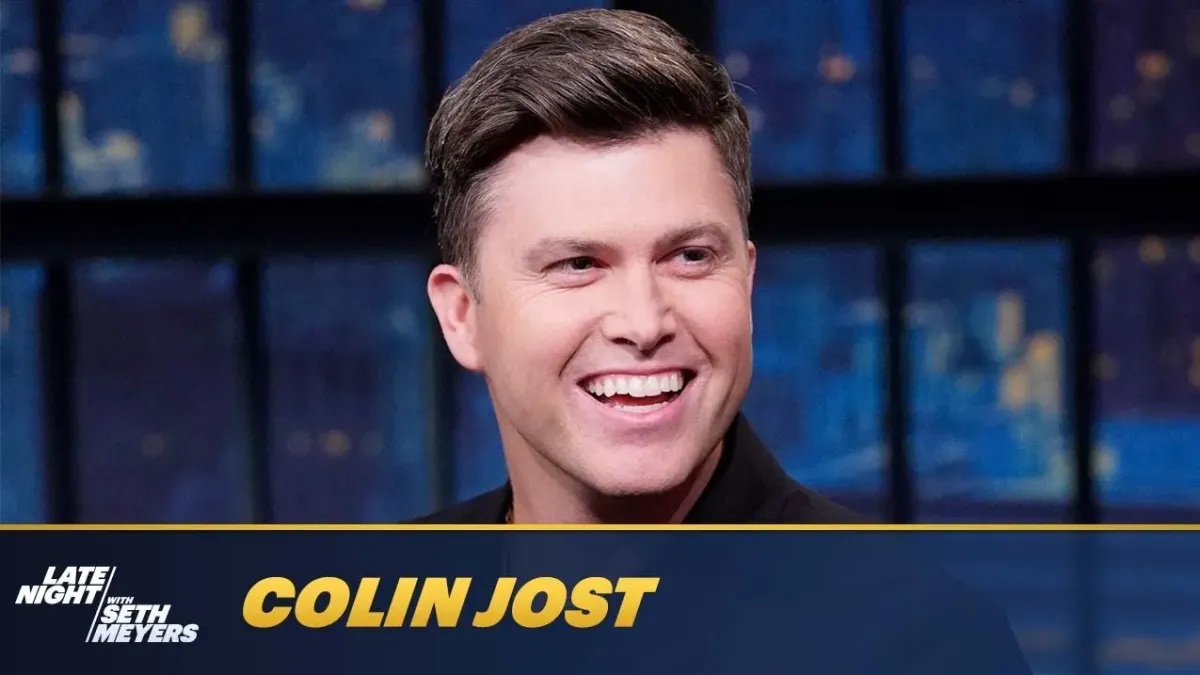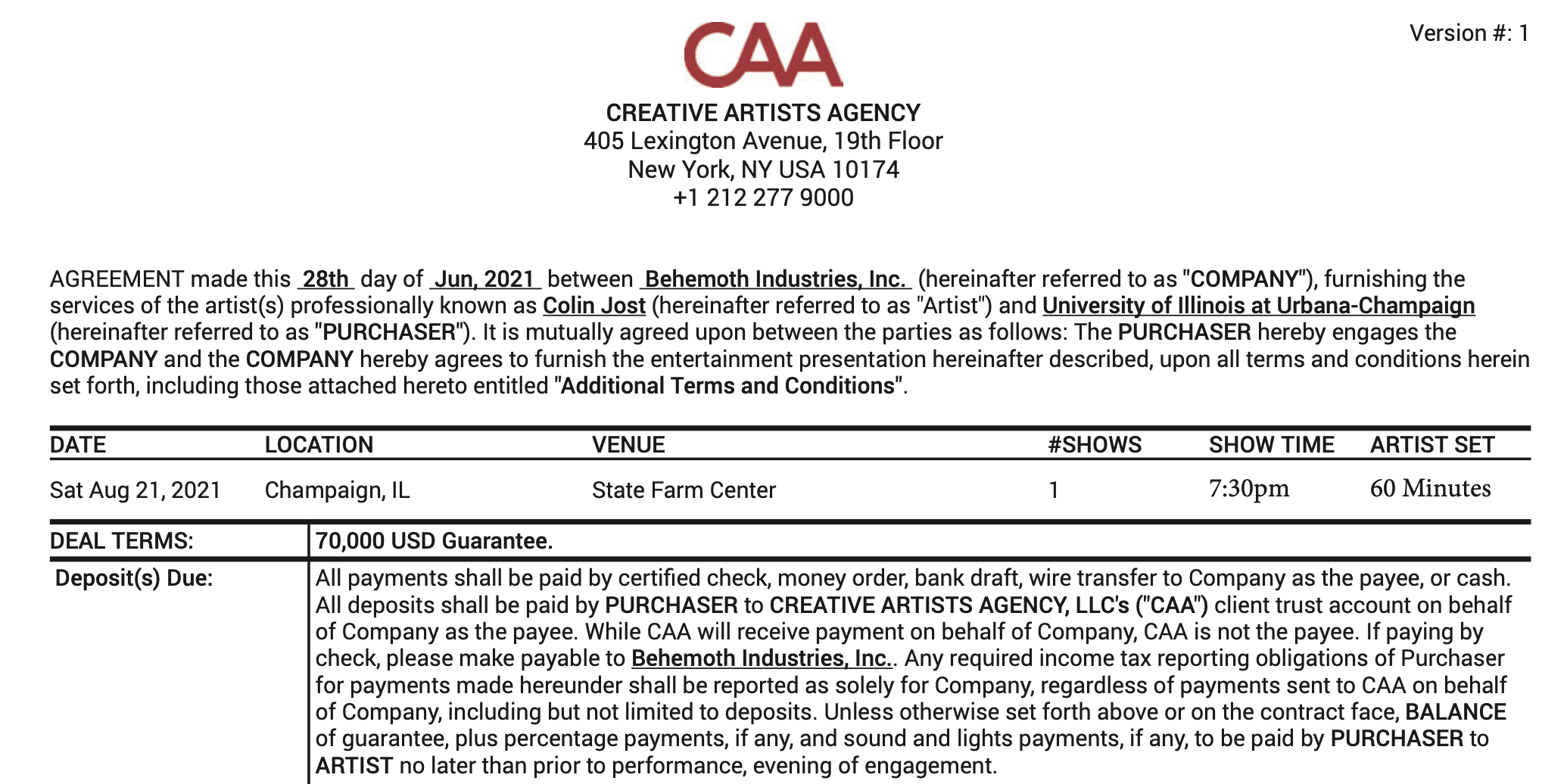Seventy Thousand Dollars
You might want to sit down for this one.

I told you I'd tell you and now I'm telling you: Colin Jost's fee for a show at the University of Illinois at Urbana-Champaign this past August was seventy thousand smackers. This is per contracts I obtained from UI via an open records request—see for yourself:

Humorism friend Ryan S. had the closest guess without going over: congratulations Ryan. Several readers guessed much higher than $70,000, and I applaud each of them for their cynicism. In any case: wow, that's a lot of cheddar!
As I noted before, the fee for his scheduled support acts, Steven Castillo and Andrew Dismukes, was $5,000 apiece. It looks like they didn't end up performing, though—the UI student newspaper's review of the show names Maggie Winters and Calvin Evans as Jost's openers. It also describes some of Jost's material:
He started off his show with Champaign-themed jokes, including poking fun at our beloved nickname “Chambana.”
“That sounds like something you’d use to clean up champagne,” he said. “Or, it’s like, do you want champagne with some banana in it?”
He also commented on our large Greek system, catapulting him into speaking a few sentences in Greek (yes, you read that right, Greek).
It was clear that he absolutely loved interacting with the audience as they shouted out silly questions and phrases.
“I love your wife!” someone in the audience said. “Thank you, me too,” Jost responded. This was a popular interaction.
He also asked the audience what their majors were, and man, that was a fun bit.
“Accounting!” someone said. Jost responded, “Oh, I’m sorry.” “Political Science!” someone else said. “The only non-science science?” Jost asked.
Then he always circled back to a new joke he wanted to test on the audience, one being a turtle joke. He was even cracking himself up on stage! It somehow made the audience laugh, too, even though it didn’t make complete sense. Everyone just went along with it because hey, it’s Colin Jost.
I've held off on this Big Reveal because I was hoping first to get a sense through other FOIL requests of how Jost's premium has risen over the years. Unfortunately, other institutions aren't as speedy as UI. In any case, it's worth disclaiming that $70,000 is not an extraordinary fee for A-list comics like Jost, who do generally make ungodly money from live shows at large theaters and/or arenas, like UI's 15,500-seat State Farm Center. Of course, those fees generally correlate with ticket sales (often on top of guarantees), whereas this was a free show at a public university charging $16,866 for in-state tuition and $34,316 for out-of-state tuition. But the college circuit has always been famously lucrative for comedians, and the Josts of the world will command princely sums wherever they go.
There are two things that interest me here, other than the fact that Colin Jost's fee could pay for four in-state UI students or two out-of-state students. One is the immense pay gap between Jost's fee and that of his (planned) openers. Steven Castillo and Andrew Dismukes are both extremely funny comedians—much funnier, I would argue, than Jost. It seems to me that in a world where 60 minutes of Colin Jost is worth $70,000, their 15-minute sets should be worth at least a little more than 1/14th of that. The natural rejoinder is that pay in media corresponds less with talent than with fame, which is true, but so is this: when arbitrariness is the rule—and few things are more arbitrary than fame—then any arbitrary thing is possible. If someone can earn tens of thousands of dollars because they're famous but not funny, why shouldn't someone else earn tens of thousands of dollars because they're funny but not famous? The only reasons to accept one but not the other are apathy and learned helplessness.
I will return to this thought momentarily.
The second thing that interests me is the obvious: there's gobs of money in live comedy. The problem (also obvious) is most comedians don't get any of it. You may have noticed the recent hubbub over Spotify taking down large swaths of its comedy offerings in response to demands that it pay royalties to comedians for their writing (on top of performance royalties). Per the Wall Street Journal:
Spotify Technology SA SPOT -0.45% has removed the work of hundreds of comedians, including John Mulaney, Jim Gaffigan and Kevin Hart, amid a new fight over royalty payments.
Tiffany Haddish, Mike Birbiglia and a host of other popular acts have joined a group of entertainers trying to get paid a royalty on a copyright for jokes they wrote when they are played on radio and digital service providers like Spotify, SiriusXM, Pandora and YouTube.
The comedians’ effort is largely led by Spoken Giants. The global rights administration company, founded in 2019, wants to collect royalties for underlying composition copyrights of spoken-word media—essentially, the comedians’ words—similar to how songwriters are paid for use of their music and lyrics.
Spotify took the content down after reaching an impasse with Spoken Giants.
As Sean McCarthy argued in his newsletter, much of the reporting and commentary on this issue is wrong. Contra the complaints by many comedians affected, Spotify has not refused to pay artists what they are legally owed. There currently is no royalty category for literary works in comedy albums. What's happening is that an organization called Spoken Giants is trying to create one. It signed up a bunch of comedians and started negotiations with streaming and radio companies; those negotiations reportedly hit a snag last month, and Spotify responded by taking down content until it's resolved.
Necessary caveat: Spotify is an exploitative company that treats all comedians not named Joe Rogan like shit. No one should trust it. But I would argue that comedians should be similarly skeptical of outsider executives, like Spoken Giants CEO Jim King (formerly of music licensing giant BMI), who swoop into comedy with designs to invent a new type of passive income. Here's Jessica Mozes, executive producer at comedy record label Blonde Medicine, clearing up some of the misconceptions about this dispute:
Now, you may be saying, "where’s my Publishing money?! I want that same cut song writers get for my joke writing!" And to that I say, while I'm not a lawyer, I’ve had a really hard time finding a solid basis in copyright law.December 4, 2021
Many have invoked Literary Works as the basis for copyright protection and royalties. Here is how @CopyrightOffice outlines Literary works -https://t.co/FpwRxfxDvw pic.twitter.com/OWRE8A39bKDecember 4, 2021
“Comedy Routines / Stand Up Routines” as well as “Spoken Word Recordings” and “Podcasts” are all listed under Performing Arts - https://t.co/rf9ZZe7YY5 pic.twitter.com/cOTTtonzM8December 4, 2021
And again, the royalties associated with the Performance Rights ARE currently and correctly flowing just fine from DSPs to labels.December 4, 2021
I agree that artists (of all genres) deserve more for the exploitation of their content on streaming services, and it can be disheartening to see thousands of spins yield a few dollars, but that’s a separate issue from collecting Publishing Royalties.December 4, 2021
I get that this stuff is kinda nerdy, sorta complicated and potentially boring. And it is cathartic to say fuck Spotify, but the truth is, they always pull down tracks when there’s a claim that needs to be worked out.December 4, 2021
Maybe Spoken Giants will succeed in creating a new rights category for comedy albums. Maybe it won't. The journey toward either outcome will likely take years, given the legal questions involved and the certainty that Spotify will do whatever it can to avoid paying artists more money. While I personally am suspicious of Spoken Giants—which stands to make much more revenue from licensing fees than any individual comedian will make from their Spotify tracks—I think it's completely reasonable for comedians to join the fight. But it's important to remember that at the end of the day this is a fight for scraps. As Kyle Kinane said earlier this month, he averages about $2,000/month in royalty payments across every streaming platform—and he's undoubtedly on the upper end of the bell curve.
If you ever wanted to know why the live shows and ticket sales are important, here’s some perspective on streaming royalties. And the chart shows my $ from ALL streaming, not just Spotify and Pandora. I average $2k a month from my entire catalog. pic.twitter.com/s40xVhPKEEDecember 2, 2021
For all the vigorous discourse we've seen in the last few months over how media companies like Netflix and Spotify treat comedians, the unfortunate fact is that most comedians will never get a Netflix special or earn meaningful income from digital streaming platforms. Those fights are absolutely necessary, to be clear, but so is the fight that's not happening: the fight over live comedy, where pay has stagnated for decades and labor conditions are similarly stuck in the past. I will make the educated guess that one reason we see much less heated criticism of comedy venues is that the stakes are higher and more personal for comedians. Netflix and Spotify are faceless companies whose executives are unlikely to see your tweets, let alone ever give you a deal; club bookers have your phone number and can pay your rent next month—if you don't piss them off.
But the factors that make the stakes higher are the same factors that make the fight more winnable. Spotify will barely notice if every comedian takes their content off the platform until it pays more per stream. If a few powerful booking agents get together at their clients' urging and declare they won't work with X clubs until Y conditions are satisfied, that's a real threat. Spotify doesn't need comedians; comedy clubs can't survive without them.
Comedians have fought battles like this before, most notably at the Comedy Store in 1979 and at the Comedy Cellar in the early 2000s. They won both times and they can win again. Let Colin Jost be a lesson: this world's riches flow not to those who deserve them, but to those who take them.
Header image via YouTube/NBC.


